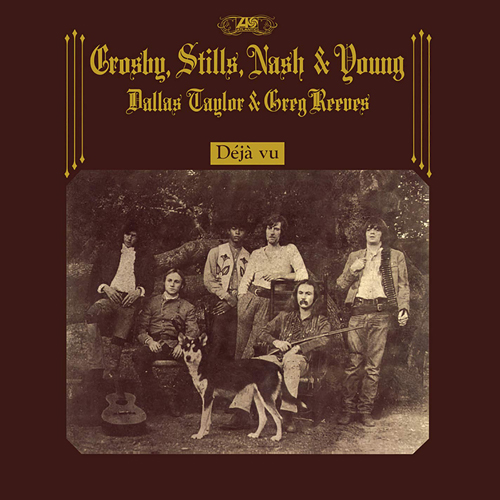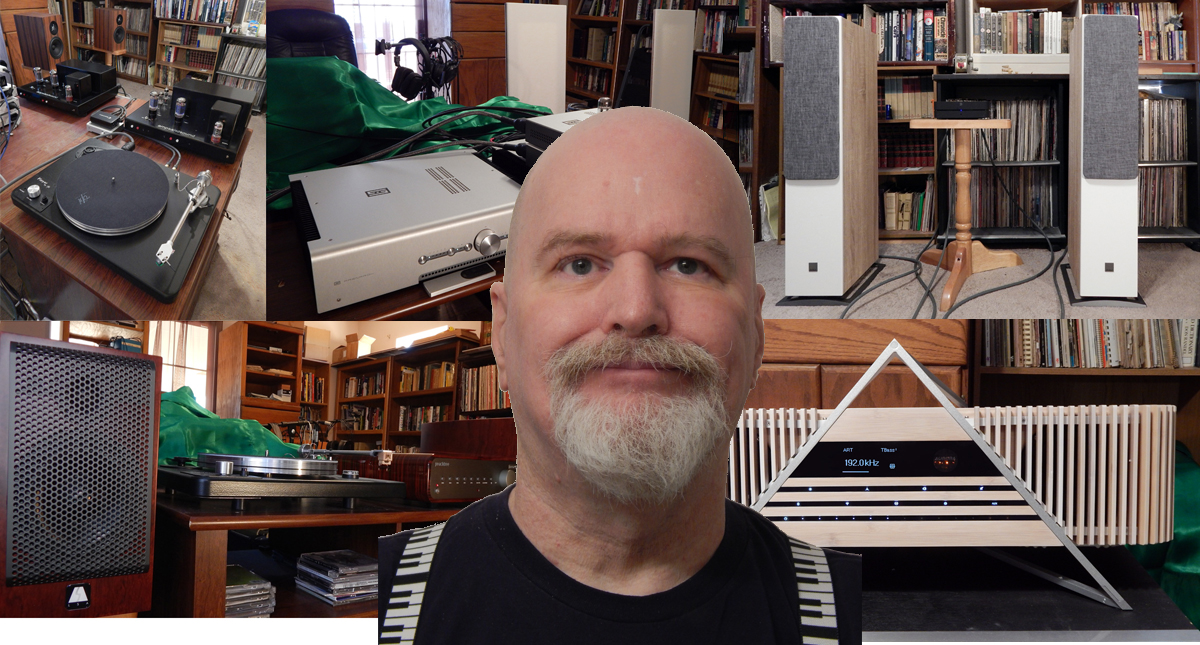Once again, I find Qobuz has launched something exciting from something old, in this case, Crosby, Stills, Nash & Young’s “Déjà Vu (50th Anniversary Deluxe Edition)” in 24-bit/192kHz (though it is mislabeled as 24-bit/44.1kHz it streamed as 192kHz). This was the band’s debut album (though Crosby, Stills & Nash had released a previous album) and an all-time favorite of mine so I’ll be commenting on the Remaster as well as the plethora of additional tracks. One of the interesting aspects of the album is that Dallas Taylor (drums) and Greg Reeves (bass) got second billing on the record cover, whereas Jerry Garcia and John Sebastian got only fine print mention.

Starting with the first track “Carry On”; like most Remasters the recording is a lot hotter than the original, but not compressed thanks to the 24-bits. It also does not appear to be remixed or reequalized, which is a good thing in my book as I tend to not like remixes (remixes that are done for sound quality rather than those that add extraneous repetitive electronic drum tracks and stupid effects like scratching, looping, sampling, reverb, delay, flanging, and phase shit in order that some DJ can claim it as their own song) as much as the original mixes which were often done with input from that actual artists. Not only does the Remaster offer greater dynamics the higher sample rate offers a much more musical presentation. All in all a net positive. Comparing the original release version of “Carry On” to the “Early Alternate Mix” on disc 4 I actually prefer the bass line on the alternate mix though the multiple lead guitar lines of the album version definitely make that the better choice.
I was especially happy to see that they included my two favorite David Crosby songs “Triad (Demo)” and “The Lee Shore (1969 Vocal) (Outtake)” I only regret that they were omitted from the original release, along with the other cut tracks if I am to be honest, some of which I have never heard but I’ll get into that later.
Speaking of David Crosby, I actually preferred the “Demo” versions of David’s songs over the fully orchestrated release versions. It appears that the grossly personal nature of his songs and voice lend themselves to stark solo guitar. This was not the case with the others, which was a bit surprising with Graham Nash as piano is a fairly robust solo instrument, though I admit there is a certain charm to the demo of “Our House” featuring Joni Mitchell doing back up notwithstanding the sound quality was pretty poor.
I preferred the vocal mix of the “(Early Version)” of “Teach Your Children” but this was more than made up for by superior musicianship and Jerry Garcia’s pedal steel guitar work.
“Almost Cut My Hair” is one of the highlights of the rerelease. Not only is there the haunting acoustic demo version mentioned above, there is also a spectacular extended (10 minutes, 14 seconds) much bluesier “(Early Version)”.
“Helpless (Harmonica Version)” is simply better than the original album version, providing greater depth and emotion, and a real mistake in the composition of the original release in my opinion.
“Woodstock” was written by Joni Mitchell based on descriptions provided by Graham Nash since she was not able to attend. The song has special significance as Woodstock was the group’s first performance together as a band. An “Alternative Vocals” version is provided, though, despite some nice natural delay on the guitar and a stellar vocal track, I really don’t like the vocal arrangement of the choruses.
There is also an “(Early Alternate Mix)” of the eponymous “Déjà Vu” which offers a much more interesting mix of the guitars and other instruments and a starker contrast in the vocals though there is a clumsy abort to the guitar lead that is covered up by the bass solo in the album version.
Which brings us to the tracks that didn’t make the final cut.
“Song With No Words (Tree With No Leaves)” is a wonderfully haunting Celtic Aire which evokes images of the earlier “Guinnervere” (from the self-titled “Crosby, Stills & Nash” album. note: both songs were composed and performed by David Crosby).
Neil Young’s “Birds (Demo)” demonstrates the group’s power as vocalists supported only by acoustic guitar.
On the other hand, “So Begins The Task/Hold On Tight (Demo)” highlights Stephen Stills’ strength as a solo artist, and could have easily been released as it stands. It also spotlights Stephen’s penchant for two-song medleys.
As with the David Crosby tunes mentioned above, “Right Between The Eyes (Demo)” is one of my favorite Graham Nash songs and it is sad that a Studio version was never recorded, though the live version on “4 Way Street” is truly epic.
Crosby, Stills & Nash’s “(Demo)” cover of John Sebastion’s “How Have You Been” has real heart and rings true for the life of the traveling musician.
“With No Expression”, which they oddly bill as “Horses Through A Rainstorm”, gets a couple of treatments, a Demo solo Graham Nash version, and an orchestrated “Outtake” version with the whole band. Though I liked the acoustic guitar version a little more, I think the orchestrated version had a real poppy sound with hit potential.
“Know You Got To Run (Demo)” though a pleasant enough Stephen Stills tune sounds a bit too much like “Everybody I Love You” so it’s not making the cut is understandable.
On the other hand “Question Why (Demo)” is another of Graham Nash’s introspective melodic tunes and well-deserving of further development, though it stands well as an acoustic guitar piece.
Like most of David Crosby’s songs “Laughing (Demo)” is well served by David’s up close and personal presentation, though the fully orchestrated version does retain most of that feel.
“She Can’t Handle It (Demo)” highlights why they all came together, its deeply personal autobiographical flavor makes it a piece that could easily have been written by any of the four. The same could almost be said of “Sleep Song” except it that it has that gentle playful romantic joyful upbeat sound that is all Graham Nash.
“Everyday We Live (Outtake)” is another solid Stills offering that is fully realized providing that signature CSN&Y sound, as is the hard rocky “I’ll Be There”.
While “Bluebird Revisited” is a lazy southern blues song with a bit of gospel feel that would have offered great contrast in the band’s sound had it made the release.
It occurs to me that the sheer number of Stills songs like “30 Dollar Fine”, “Ivory Tower”, “Same Old Song”, “Hold On Tight / Change Partners”, and “Right On Rock ‘N’ Roll”, though excellent, may account for their being dropped in the name of balance, even though David Crosby dubbed “Change Partners” the CSN&Y theme song.
As hinted above the only blemish on this brilliant 50th Anniversary rerelease of an album that in many ways defined a generation, is one cannot but regret that the original had not been released as a double album or at least that they had managed to hang together long enough for a second studio album.

Time for visiting old friends was over and it was time to look for something new and I lit upon “FLY or DIE LIVE” (24-bit/44.1kHz) by Jaime Branch. The album is billed as “Blues” but you wouldn’t guess that based on the opening track “birds of paradise” an ethereal percussion piece with an African Jazz flavor with some nice airy horn at the end. This flowed into “prayer for amerikkka pt. 1 & 2” which is true Mississippi Delta Blues with a Modern Jazz vibe and some Latin underpinnings, Jaime providing both vocal and sexy sizzling trumpet along with unrepressed anger worthy of the wokest Gangsta Rapper. Being a live recording, the songs transition uninterrupted. “lesterlude” is one of the most creative cello solos I have ever heard which opens up to “twenty-three n me, Jupiter redux” which is pure Improvisational Progressive Jazz. “reflections on a broken sea” features a lot of wild sea mammal sounds created on bowed cello which continues through “whales”. “theme 001” opens with a percussion solo which is soon joined by contrabass and cello at which point it becomes clear that there is actually two bass players one working mostly with bow, all of which is punctuated by Jaime’s trumpeting. Since this little gem contains 18 songs I won’t continue to belabor each track except to say that while each is unique the overall feel is Modern Progressive Jazz with attitude and well worth the listen.
Until next month, remember, it’s about the music.








Leave a Reply
Want to join discussion?
Feel free to contribute!